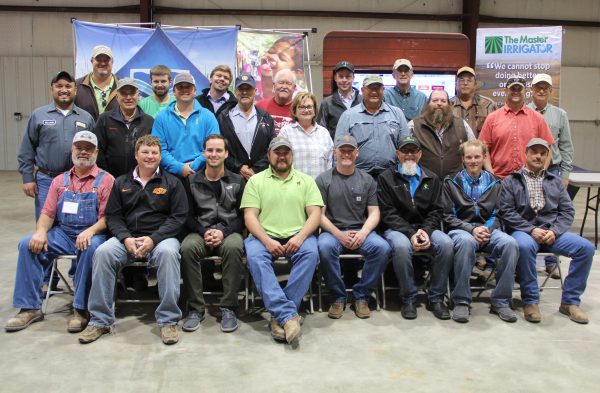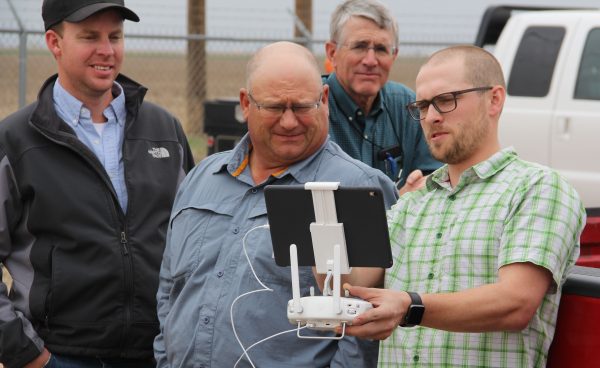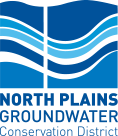District Congratulates a New Graduating Class of Master Irrigators
A second group of truly progressive farmers has completed the course work necessary to attain the distinction of Master Irrigators. The 2017 Master Irrigator graduating class includes 23 irrigating growers from the North Plains Groundwater Conservation District (NPGCD) and an engineer from the USDA’s Natural Resources Conservation Service (NRCS). All 24 graduates completed approximately 24 hours of training in the latest irrigation practices and technologies to achieve this recognition, preparing themselves to make the most of every drop of irrigation water they use in their operations.

Twenty-four graduates make up the Master Irrigator Class of 2017. Graduates attended four, full-day sessions to complete the course and qualify for a specially designated Natural Resources Conservation Service, Environmental Quality Incentives Program fund.
The Master Irrigator program is a collaborative effort between NPGCD and NRCS. The program is designed to increase adoption of proven conservation technologies and practices by reducing the learning curve for irrigators. NRCS State Irrigation Engineer Keith Sides, said this program has far reaching positive effects. “Any time you can educate producers about newer technologies and bring another tool into their toolbox for water conservation, that helps production ag in the High Plains and in the State of Texas overall.”
As a bonus, these graduates have earned priority access to a special NRCS Environmental Quality Incentives Program (EQIP) fund to be used to put some of the techniques and technologies into practice on their own farms. Master Irrigator trains farmers about advanced irrigation management and conservation practices that work together to save water, conserve energy and build healthy soil. “The producers in the first two years of the Master Irrigator program farm over 100,000 acres in the NPGCD. That means these ideas have reached the people with the ability to implement conservation on about 10-percent of the irrigated acres in the district in just two years,” said Steve Walthour, NPGCD general manager.

Master Irrigator presenter farmer, Bryce Howard, demonstrates the drone he uses in a variety of ways in his own operation. Class of 2017 graduates (left to right) Travis Spence, Darren Stallwitz, and Rex McCloy observe.
This year’s class learned about the realities of conservation tillage practices, from strip-till to no-till. They also heard and saw the latest technologies in irrigation systems including, sub-surface drip irrigation (SDI), Portable Mobile Drip Irrigation (PMDI), and Low Energy Precision Application (LESA), along with innovations in nozzle design that are taking center pivot efficiency even higher. Additionally, the program covered how plant nutrition, seeding rates, planting dates and many other operational practices can be optimized to allow growers to get more yield with less water. Finally, participants explored irrigation scheduling and tools, including soil moisture monitoring, variable rate irrigation, pivot monitoring and control, and remote sensing that provide precision as to when, and how much, water the plant needs.
“This is the next logical step and compliment to the district’s demonstration projects that have shown over the past seven years how effective this approach is,” said Steve Amosson, PhD., Texas A&M Regents professor and extension economist and project facilitator for the Master Irrigator program. “There is admittedly a lot of information out there for irrigators to try to assimilate, and the Master Irrigator is an attempt to help sort it out, so they can make sound decisions for their operations.”
The assistance continues even when the classes are over. Participants will have technical in-season consultation available to make sure implementation is effective. NPGCD and NRCS personnel, as well as industry experts will be available to answer questions, and even make house calls if necessary, to assist growers with the deployment of their new conservation practices.
For more information about the Master Irrigator program contact Kirk Welch at kwelch@northplainsgcd.org or go online to northplainsgcd.org/masterirrigator. For additional information about the EQIP program, contact your local NRCS office or access www.tx.nrcs.usda.gov. USDA is an equal opportunity provider, employer and lender.
